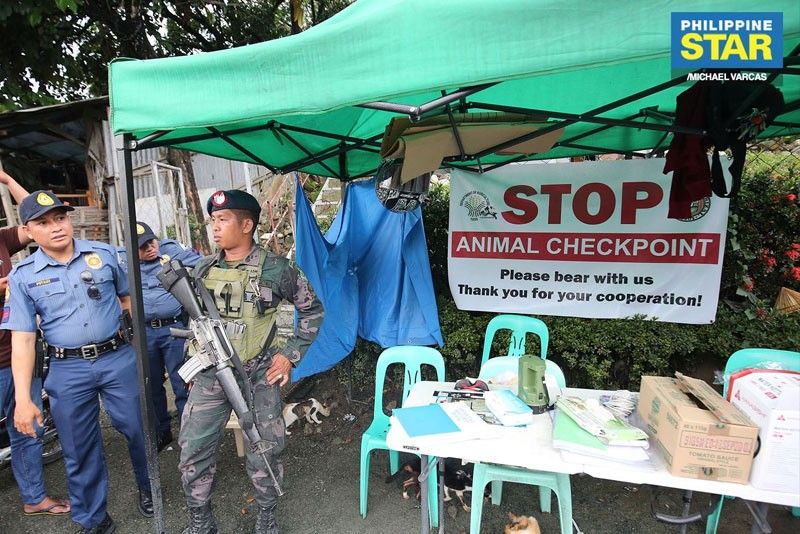ASF quarantine areas expanded

MANILA, Philippines — More areas in Central Luzon have been quarantined due to suspected cases of African swine fever (ASF), Agriculture Secretary William Dar said yesterday.
“Some are being quarantined and we are not yet identifying such so we can do our work,” Dar told The STAR in a text message.
After confirming on Monday that the recent hog deaths in Rizal and Bulacan were caused by the ASF virus, Dar said the Department of Agriculture (DA) is verifying reports of possible ASF cases in other areas, although he declined to identify these places.
Dar earlier said 7,416 pigs had been “depopulated” in the initially affected villages of San Jose, Macabud, San Isidro, San Rafael and Mascap, all in Rodriguez, Rizal; Cupang in Antipolo, and Guiguinto in Bulacan.
Meanwhile, Quezon City Mayor Joy Belmonte confirmed last night that the 11 dead pigs found recently in Barangay Bagong Silangan tested positive for ASF.
Belmonte said she would meet with concerned officials tomorrow to gather all validated data and decide on how to address the entry of the virus in the country.
Earlier, she ordered all backyard piggeries in the city closed as a preventive measure against ASF.
Cooperate and report
Reacting to reports about the 55 dead pigs dumped in the Marikina River, Dar urged hog raisers to cooperate and report suspected ASF-related deaths.
“The problem is in ground zero, in the earlier affected areas, a lot of hog raisers hid deaths. This is now the problem,” Dar told journalists at a press conference on Friday.
“We are spreading the virus and this is what is happening – dumping these dead pigs in the river,” he said.
In an interview with CNN Philippines yesterday, Bureau of Animal Industry (BAI) officer-in-charge Ronnie Domingo said laboratory tests were being conducted on the dead hogs found in Marikina River.
“At the moment we are waiting for the laboratory results. We have collected samples. The immediate concern is to retrieve all these animals and dispose of them properly by burial. And next week we will see more actions related to this development,” Domingo said.
While the DA has sent samples to the OIE (World Organization for Animal Health) reference laboratory in England for the initial ASF-caused hog deaths, Domingo said succeeding tests would be done in the Philippines.
“The results from the OIE show that we are also capable of doing the same tests because before sending the samples to the UK, our lab has submitted similar results,” Domingo said.
He said the regional directors of the DA were ordered to conduct surveilance in provinces and municipalities to help stop the spread of the virus.
Domingo said there are still hog raisers and traders who are not cooperating or refuse to believe in the seriousness of the impact of the ASF virus.
Dar earlier appealed to people with ASF-affected hogs to immediately report deaths to authorities, particularly to the BAI, National Meat Inspection Service and provincial veterinary offices.
He said prompt reporting would enable authorities to immediately enforce the 1-7-10 protocol in managing, containing and controlling suspected swine diseases.
He urged backyard hog raisers to cooperate.
When asked how the virus reached the farms, the DA said it might be through food scraps from hotels and restaurants, or by pork products brought home by overseas Filipino workers.
Dar earlier said that while the ASF could not be transferred to humans, they could be carriers of the virus.
“The spread of that will really be a big issue that we are monitoring. We wouldn’t want it to spread,” Dar earlier said in an interview with One News on Cignal TV.
“Once you contracted this and you go to a hog raisers area, the pathogen will be transferred immediately to the hogs,” he said.
‘No ASF in Pangasinan’
Meanwhile, the province of Pangasinan remains free from ASF virus.
Jovito Tavajeros, chief of the Provincial Veterinary Office, told The STAR that there have been no reports of ASF cases in his jurisdiction.
Tavajeros said Gov. Amado Espino III on Tuesday banned from entering Pangasinan all swine coming from other provinces.
The ban came amid reports of pig deaths in the provinces of Rizal and Bulacan.
Tavajeros said they are strictly monitoring the entry of swine through checkpoints set up in strategic areas.
He advised hog raisers to have the blood of their swine undergo laboratory tests should they observe something unusual.
The province has an animal laboratory in Sta. Barbara town.
Tavajeros said there were no reports of dead pigs dumped in rivers in their province.
Highly contagious
The ASF is a highly contagious hemorrhagic disease of pigs, warthogs, European wild boar and American wild pigs.
Mortality rates are as high as 100 percent.
Health Secretary Francisco Duque had dispelled fears, saying ASF has no effect on people’s health, although he encouraged the public to cook meat well.
“As long as pork is bought from reliable sources and it is cooked thoroughly, it is safe to eat,” Duque said.
The P260-billion swine industry provides and sustains the livelihood of millions of Filipino families, as roughly two-thirds or 65 percent of the industry is contributed by small backyard raisers.
Dar said the DA’s Agricultural Credit Policy Council (ACPC) approved a P60-million livelihood assistance fund for hog raisers affected by ASF.
Under the program, farmers can avail themselves of P30,000 loan with interest payable in three years.
The Department of Budget and Management earlier released P82.5 million for the implementation of measures that aim to prevent the further spread of ASF in the country. – With Janvic Mateo, Eva Visperas
- Latest
- Trending





























